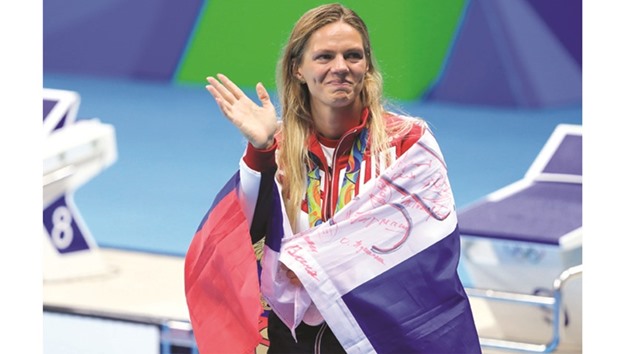Russian swimmer Yulia Efimova, who was booed on the podium after taking the silver medal in the women’s 100m breaststroke, hit out at competitors who badmouthed her for doping, and claimed the West was using sport to fight a new Cold War.
US swimmer Lilly King, who won gold, had been involved in a spat with Efimova prior to the race, and a number of other competitors had registered their frustration that Efimova, who was banned twice for doping, had been allowed to take part.
“I understand the people who didn’t congratulate me because the media was full of fake stories about me,” said Efimova, Russia’s Tass agency reported from Rio. “But on the other hand I don’t really understand the foreign competitors. All athletes should be above politics, but they just watch TV and believe everything they read. I always thought the Cold War was long in the past. Why start it again, by using sport?”
Her comments reflect the widely held view in Russia that the bans are part of an anti-Russian conspiracy, despite evidence of the state colluding in a massive doping programme.
“I’m really happy, because what has happened to me is unbelievable. I made a mistake once, and I served the punishment. What happened the second time wasn’t my fault. I don’t know if I should explain in front of everyone,” Efimova added.
Efimova tested positive for a banned steroid in 2013, and then again this winter for meldonium. She claimed she had stopped taking meldonium before it was outlawed but the drug was still in her system, and she was allowed to compete after the Internationl Swimming Federation lifted the ban after advice from the World Anti-Doping Agency who are further researching the drug.
Her appearance at Rio was nevertheless in doubt until the last minute, after a ruling that no Russian competitor who had served a previous ban for doping could compete, which was overturned on appeal on the eve of the Games.
“I don’t even know how I made it to the final,” she continued. “The last few weeks have been very hard, and I can’t remember the last time I had more than four hours of sleep. I wasn’t in my best form. I’m really upset I couldn’t win today.”
Many of her competitors had little time for the idea of Efimova as the victim, however. King had reacted angrily to Efimova raising her finger in a “No.1” gesture after winning her semi-final, and Swedish swimmer Jennie Johansson, who just missed out on the final, voiced her frustration with Efimova on Instagram.
“Unfortunately I finished ninth… My heart and my mind will still be swimming in that final even if the actual lane is taken by someone that doesn’t deserve it,” she wrote. Many in the crowd booed Efimova’s entrance prior to the race, and again when she took the podium.
Afterwards, King was unrepentant on her earlier comments about Efimova.
“I basically said what everybody’s thinking,” she told journalists after the final. “They were glad I spoke out and I had the guts to say that and I appreciate their support. Standing up for what I believe is right, I felt like I had to perform even better tonight than I have in the past.”
Many athletes and other officials have expressed anger that Russians were allowed to compete at Rio, given the severity of the allegations involving a complicated, state-run doping programme and cover-up. However, Russian president Vladimir Putin and other top officials have repeatedly claimed the allegations against Russia are politicised.
“The deliberate campaign targeting our athletes was characterised by so-called double standards,” Putin said on the eve of the Games. He claimed medals won at these Olympics would be worth less because “strong competitors” from Russia had been kept out.
As first revealed by the Observer, the entire Russian team has been banned from the Paralympics, with International Paralympics Committee president Philip Craven saying: “Their medals over morals mentality disgusts me.”

Yulia Efimova
